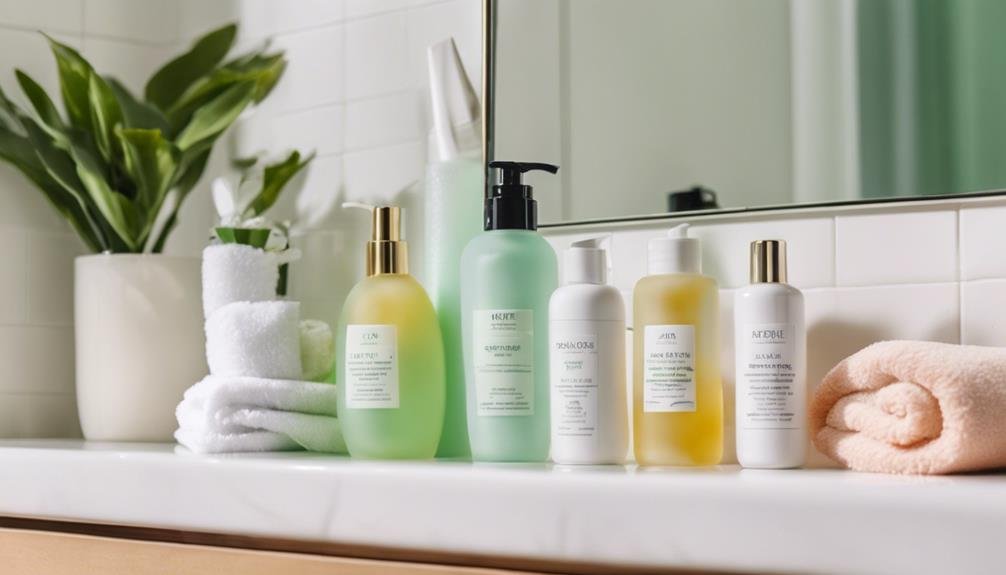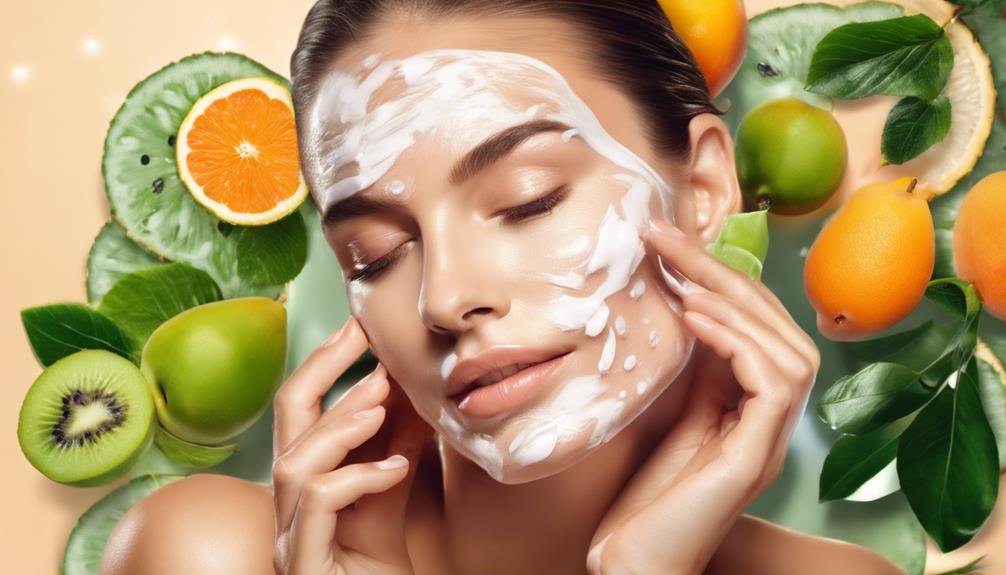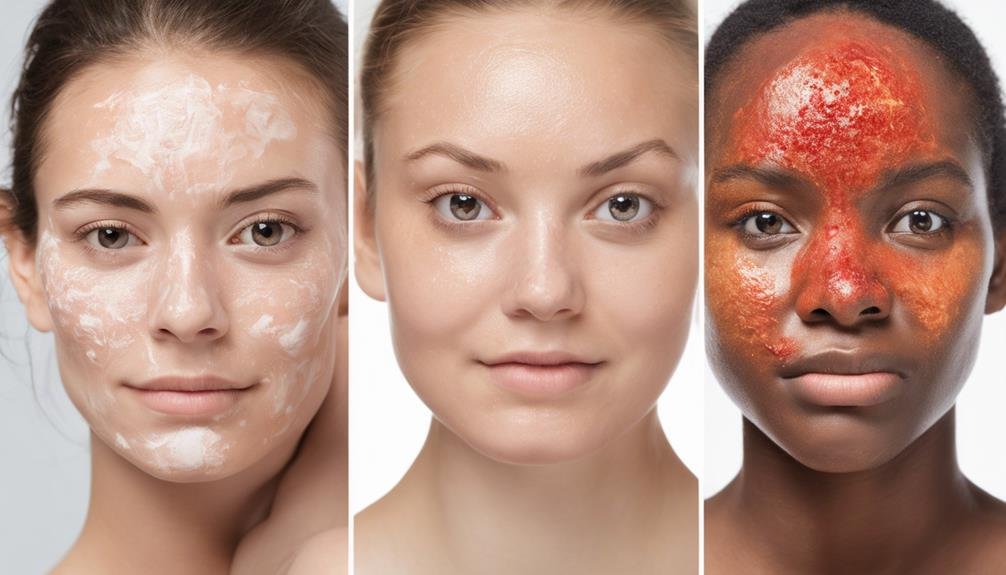"Cherishing Little Steps - A Haven for Baby and Family Journeys"
How to Keep Skin Clear and Bright
If you've noticed that your skin isn't as radiant as you'd like it to be, there might be a few simple tweaks you can make to your routine. Clear and bright skin is often attainable through consistent care and healthy habits. But what if I told you that achieving that glowing complexion could be easier than you think? Let's explore some practical tips that could help you unveil your skin's natural luminosity without much hassle.
Key Takeaways
- Follow a consistent skincare routine with cleansing, moisturizing, and sunscreen.
- Stay hydrated by drinking enough water daily for skin health.
- Incorporate antioxidant-rich foods like berries and nuts in your diet.
- Manage stress through mindfulness, quality sleep, and regular exercise.
- Avoid skincare mistakes like over-exfoliating and skipping sunscreen.
Establishing a Skincare Routine

When it comes to achieving clear and bright skin, establishing a consistent skincare routine is essential. Your routine should include cleansing, moisturizing, and protecting your skin from the sun.
Cleansing helps remove dirt, oil, and impurities that can clog pores and lead to breakouts. Choose a gentle cleanser suitable for your skin type, whether it's dry, oily, combination, or sensitive.
After cleansing, apply a moisturizer to keep your skin hydrated and supple. Moisturizing prevents dryness and helps maintain a healthy skin barrier. Look for a moisturizer with ingredients like hyaluronic acid, glycerin, or ceramides for optimal hydration.
Don't forget to protect your skin from the sun's harmful UV rays by applying a broad-spectrum sunscreen with at least SPF 30 daily. Sunscreen helps prevent premature aging, dark spots, and skin cancer. Make sure to reapply every two hours, especially if you're outdoors.
Cleansing and Exfoliating Techniques
To effectively cleanse and exfoliate your skin, it is crucial to understand the proper techniques that can help maintain its clarity and brightness. Cleansing removes impurities and excess oils, while exfoliating helps to slough off dead skin cells, revealing a fresh and radiant complexion. When cleansing, use gentle circular motions to avoid irritating the skin. For exfoliation, choose a product suited to your skin type and be mindful not to over-exfoliate, as this can lead to irritation and sensitivity.
Here is a table outlining some key cleansing and exfoliating techniques:
| Cleansing | Exfoliating |
|---|---|
| Use a gentle cleanser | Choose a suitable exfoliant |
| Avoid harsh scrubbing | Exfoliate 1-3 times a week |
| Pat dry with a soft towel | Avoid over-exfoliating |
| Follow with a moisturizer | Be gentle, especially on the face |
| Consider double cleansing | Use a gentle touch for best results |
Hydration and Moisturization Tips

For optimal skin health, ensuring proper hydration and moisturization is essential. Hydration helps maintain skin elasticity and promotes a radiant complexion. Start by drinking an adequate amount of water daily to keep your skin hydrated from the inside out. Aim for at least 8 glasses a day, adjusting based on your activity level and climate.
When it comes to external moisturization, choose products that suit your skin type. For dry skin, opt for richer, cream-based moisturizers, while those with oily skin should look for lightweight, non-comedogenic options. Apply moisturizer to damp skin to lock in moisture more effectively. Consider using a hydrating serum with ingredients like hyaluronic acid to boost skin hydration.
Remember that moisturizing is crucial year-round, not just in colder months. By incorporating these hydration and moisturization tips into your skincare routine, you can help maintain clear, bright, and healthy-looking skin.
Importance of Sun Protection
Proper sun protection is a fundamental aspect of maintaining skin health and preventing premature aging. Exposure to the sun's harmful UV rays can lead to a variety of skin issues, including wrinkles, dark spots, and an increased risk of skin cancer. To protect your skin, it's essential to apply a broad-spectrum sunscreen with at least SPF 30 daily, even on cloudy days. Reapply every two hours, especially if you're sweating or swimming. Wearing protective clothing, hats, and sunglasses can further shield your skin from sun damage.
Choosing a sunscreen that suits your skin type is crucial. Opt for non-comedogenic formulas if you have oily or acne-prone skin, and look for hydrating ingredients like hyaluronic acid if your skin is dry.
Remember that sun protection isn't just for the beach – UV rays can penetrate windows and cause damage indoors too. By incorporating sun protection into your daily routine, you can maintain clear, bright, and healthy skin for years to come.
Incorporating Antioxidants in Diet

Incorporating antioxidants into your diet is a key strategy for promoting skin health and combating the effects of environmental stressors. Antioxidants are powerful compounds that help neutralize free radicals in the body, which can cause damage to skin cells and accelerate aging. Including foods rich in antioxidants, such as berries, leafy greens, nuts, and seeds, can provide your skin with the necessary nutrients to maintain a clear and bright complexion.
Vitamin C, found in citrus fruits and bell peppers, is a potent antioxidant that supports collagen production and helps protect the skin from UV damage.
Vitamin E, abundant in almonds and spinach, works synergistically with vitamin C to enhance skin repair and hydration.
Additionally, selenium from Brazil nuts and zinc from legumes play crucial roles in maintaining skin elasticity and reducing inflammation.
Stress Management for Skin Health
To maintain your skin's clarity and brightness, it's important to address not just external factors like diet, but also internal influences such as stress. Managing stress plays a crucial role in promoting skin health and radiance. Here are some tips to help you effectively manage stress for the benefit of your skin:
- Practice mindfulness: Engage in activities like meditation or deep breathing to reduce stress levels.
- Get quality sleep: Aim for 7-9 hours of quality sleep each night to allow your skin to repair and rejuvenate.
- Stay active: Regular exercise helps release endorphins, which can reduce stress and improve overall skin health.
- Connect with loved ones: Spending time with friends and family can offer emotional support and help alleviate stress.
- Prioritize self-care: Take time for activities you enjoy, whether it's reading, gardening, or simply relaxing in a bath.
Choosing the Right Products

When it comes to maintaining clear and bright skin, selecting the right products is essential. The market is flooded with skincare options, making it crucial to choose wisely. Look for products that suit your skin type and address your specific concerns, such as acne, aging, or sensitivity. Ingredients like hyaluronic acid, vitamin C, and retinol can be beneficial for various skin issues. Remember to patch test new products to avoid potential reactions.
Opt for gentle cleansers that won't strip your skin of its natural oils. Moisturizers should be hydrating yet lightweight, especially for oily skin. Sunscreen is non-negotiable to shield your skin from harmful UV rays and prevent premature aging. Exfoliants can help slough off dead skin cells, revealing a brighter complexion. If you're unsure where to start, consulting a dermatologist can provide personalized recommendations.
Understanding Skin Types
Understanding your skin type is fundamental to crafting an effective skincare routine that caters to your unique needs. Identifying whether you have oily, dry, combination, sensitive, or normal skin can help you choose the most suitable products and treatments. Here are some key indicators to help you determine your skin type:
- Oily Skin: You may notice excess shine, enlarged pores, and a tendency to break out.
- Dry Skin: Tightness, flakiness, and a lack of moisture are common signs.
- Combination Skin: This type features oiliness in the T-zone (forehead, nose, and chin) and dryness in other areas.
- Sensitive Skin: Easily irritated, prone to redness, itching, or burning sensations in response to products or environmental factors.
- Normal Skin: Balanced, with few imperfections and well-hydrated without being excessively oily.
Understanding your skin type enables you to tailor your skincare regimen for optimal results, ensuring your skin remains clear, bright, and healthy.
Regular Exercise for Skin Glow

Enhancing your skin's radiance goes beyond skincare products; incorporating regular exercise into your routine can significantly contribute to a healthy and glowing complexion. Exercise increases blood flow, delivering essential nutrients and oxygen to your skin cells, promoting a natural glow.
Additionally, physical activity helps flush out toxins through sweat, which can prevent breakouts and improve overall skin health.
Regular exercise also plays a crucial role in reducing stress levels, a common trigger for skin issues like acne and eczema. When you exercise, your body releases endorphins, which can help lower stress and improve your mood.
This reduction in stress can lead to clearer skin and a more radiant complexion.
Furthermore, exercise can improve your sleep quality, another essential factor for skin health. Getting an adequate amount of rest allows your skin to repair and regenerate, leading to a fresher and brighter appearance.
Aim for a mix of cardiovascular exercises, strength training, and flexibility exercises to maximize the benefits for your skin. Remember, consistency is key to reaping the rewards of exercise for glowing skin.
Beauty Sleep and Its Benefits
To achieve a radiant complexion, prioritizing your beauty sleep is crucial. Quality sleep plays a significant role in skin health and overall well-being. Here are five benefits of getting ample beauty sleep:
- Improved Skin Regeneration: During deep sleep, the body repairs and regenerates skin cells, leading to a more youthful and vibrant complexion.
- Reduced Inflammation: Proper sleep helps decrease inflammation in the body, reducing redness and puffiness in the skin.
- Enhanced Collagen Production: Adequate rest promotes collagen production, which maintains skin elasticity and firmness.
- Decreased Under-Eye Circles: Getting enough sleep can minimize dark circles and under-eye bags, giving your face a fresher appearance.
- Balanced Hormones: Sleep helps regulate hormone levels, which can prevent breakouts and promote a clearer complexion.
Prioritizing your beauty sleep is a simple yet effective way to support your skin's health and achieve that coveted clear and bright glow.
Avoiding Common Skincare Mistakes

Common skincare mistakes can hinder your efforts to achieve clear and healthy skin. One common mistake is over-exfoliating. While exfoliation is essential for removing dead skin cells, doing it too frequently can strip your skin of its natural oils, leading to dryness and irritation. It's recommended to exfoliate 1-2 times per week for most skin types.
Another mistake isn't wearing sunscreen daily. Sun damage is a major contributor to premature aging and skin cancer. Make sure to apply a broad-spectrum sunscreen with at least SPF 30 every day, even on cloudy days.
Using skincare products that aren't suitable for your skin type is another common error. It's crucial to know your skin type and choose products that cater to its specific needs. Consult with a dermatologist if you're unsure.
Lastly, sleeping with makeup on can clog your pores and lead to breakouts. Always cleanse your face before bed to remove makeup and impurities. By avoiding these common skincare mistakes, you'll be on your way to clearer and brighter skin.
Professional Skincare Advice
For optimal skincare results, seeking advice from a professional dermatologist or skincare specialist can provide valuable insights tailored to your specific skin concerns and goals. These experts can assess your skin condition, recommend personalized treatments, and help you achieve a clear and bright complexion.
Here are five key pieces of professional skincare advice to consider:
- Regular Skin Check-ups: Schedule routine appointments with a dermatologist to monitor your skin health and address any emerging issues promptly.
- Customized Skincare Routine: Work with a specialist to establish a skincare regimen that addresses your unique needs, including the right products and techniques.
- Professional Treatments: Explore options like chemical peels, microdermabrasion, or laser therapy under the guidance of a skincare professional.
- Sun Protection: Receive expert advice on choosing the most effective sunscreen and sun protection measures for your skin type.
- Healthy Lifestyle Habits: Experts can offer guidance on factors like diet, hydration, and stress management, which can impact your skin's appearance and health.
Frequently Asked Questions
Can Certain Foods Cause Breakouts or Dull Skin?
Certain foods can indeed cause breakouts and dull skin. It's essential to be mindful of your diet's impact on your skin. Opt for a balanced, nutrient-rich diet to promote clear and bright skin.
How Does Air Pollution Affect Skin Health?
Breathing in air pollution can clog pores, leading to inflammation and premature aging. It accelerates skin damage by generating free radicals. You should cleanse your face daily to remove pollutants and use antioxidant-rich products for protection.
Is It Necessary to Change Skincare Products Seasonally?
You should consider changing skincare products seasonally to address varying skin needs. Factors like humidity, temperature, and sun exposure affect skin. Adjusting products can help maintain skin health and appearance throughout the year.
Can Over-Exfoliation Cause Skin Damage?
Excessive exfoliation can damage your skin by stripping away protective layers, causing irritation, dryness, and sensitivity. It's essential to exfoliate gently and not exceed recommended frequencies to maintain healthy, clear, and bright skin.
What Role Does Genetics Play in Skin Clarity?
Genetics significantly influences skin clarity. Factors like collagen production, oil regulation, and pigmentation are inherited. While skincare routines help, understanding your genetic predispositions can guide more personalized choices for maintaining clear and bright skin.
Conclusion
So there you have it – follow these simple steps to keep your skin clear and bright. Just remember, despite your best efforts, sometimes your skin may have a mind of its own. Embrace the occasional breakout or dull day as a reminder that perfection is overrated. After all, imperfections are what make us unique and beautiful. Keep glowing, inside and out!

